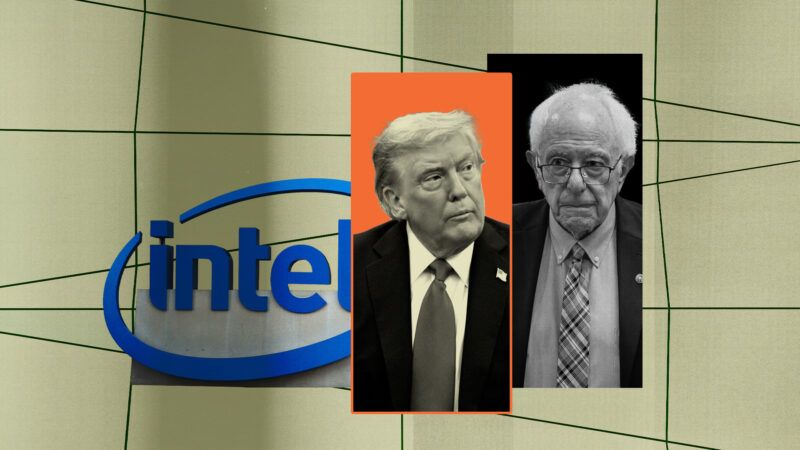Trump's Plans for Intel Take a Page From Bernie Sanders' Playbook
Turning Intel into the chipmaking equivalent of Amtrak is unlikely to be good news for American taxpayers or the company itself.

President Donald Trump is not the first prominent American politician to demand that the federal government take partial control of Intel and other manufacturers of advanced computer chips.
But it might surprise you to learn whose idea he has embraced.
During debate over the CHIPS and Science Act, the 2022 bill that ultimately delivered $52 billion in subsidies to chipmakers, Sen. Bernie Sanders (I–Vt.) floated the very same idea that Trump is now pursuing: that the government ought to have a stake in those companies.
In a July 2022 statement, Sanders explained that he was opposed to the CHIPS Act, which he viewed as a "bribe" being paid to tremendously wealthy companies that had no need for a government handout. (On that point, he was not wrong.)
Sanders, like Trump, said he viewed the chip companies as being essential to national security. But he refused to vote for the bill unless the subsidies came with some serious strings attached. Among them: "Companies must agree to issue warrants or equity stakes to the federal government."
His demands were not met, and Sanders ultimately voted against the bill. It passed anyway.
Now the Trump administration is effectively doing what Sanders wanted—but without congressional authorization. The Trump administration is seeking a 10 percent stake in Intel, Bloomberg reported this week, which would involve converting some or all of the company's CHIPS Act grants into equity in the company. The exact terms of the deal remain unclear, but Commerce Secretary Howard Lutnick confirmed the plan on Tuesday morning.
"We should get an equity stake for our money, so we'll deliver the money which was already committed under the Biden administration," Lutnick told CNBC. He promised to "get a good return for the American taxpayer."
The first part could have come directly from Sanders' communications team, but the second part is even more dubious. Turning Intel into the chipmaking equivalent of Amtrak is unlikely to be good news for American taxpayers or the company itself. Once the government has a stake in Intel, politicians will have a strong incentive to keep propping it up via whatever means necessary—and no matter the costs to consumers or other competitors that might do the job better.
Trump's plan is just as foolish as Sanders', but the president has done a remarkable job of getting Republicans to ignore the socialist impulses that have crept into conservative politics. This business with Intel is just the latest example of that trend. It is, as Reason's Joe Lancaster put it last week, "an enormous overreach of presidential authority, completely ignoring any considerations about the proper role of government."
If the far right and far left are going to agree that the federal government should get to take over any business that it deems essential for national security, then the American economy desperately needs a political alternative that recognizes those terrible ideas for what they are.


Show Comments (32)